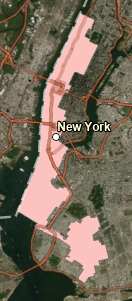Lab 1 [GIS5935]: Calculating Metrics for Spatial Data Quality
Precision provides an assessment of the consistency of a measurement method (Bolstad, 2016, p. 624), or how close the measured values are to each other. The most commonly used measurement of precision is the distance that includes 68% of the repeated observations. For this dataset, as noted in the map legend above, the 68% horizontal precision value is 4.5 m. This means that 68% of independent observations are within 4.5 m of the average location.
Alternatively, accuracy provides an assessment of how
close a value is to the true value (Bolstad, 2016, p. 624). In this lab, horizontal accuracy was estimated as the distance between the average location and a known
reference point, and was determined to be approximately 3.25 m.
With horizontal accuracy estimated as
3.25 m and 68% horizontal precision estimated as 4.5 m, we note a significant
difference of 1.25 m between these values. Using a 68% horizontal precision value estimate
means there are still 32% of the observations that exceed a 4.5 m distance from
the average location. If we tighten the comparison to the 95% horizontal precision value
estimate of 14.8 m, the results are even more disappointing compared to the horizontal
accuracy measure of 3.25 m. The horizontal precision values suggest that repeated observations
are spread across an unacceptably broad area.
Vertical accuracy was estimated as the difference
between the actual elevation of 22.58 m compared to the average elevation of 28.5
m. The difference between these two values is 5.92 m. The 68% vertical precision value was calculated as 5.9 m. In this case, the difference between these two values
is an insignificant 0.02 m, and the precision estimate is within the accuracy
tolerance 68% of the time.
There is evidence of bias in the horizontal positioning.
If we examine the map above, we can see that more repeated waypoints
are located east of the actual reference point, and more of these points are further
away compared to waypoints in the northern, western, or southern directions.




Comments
Post a Comment